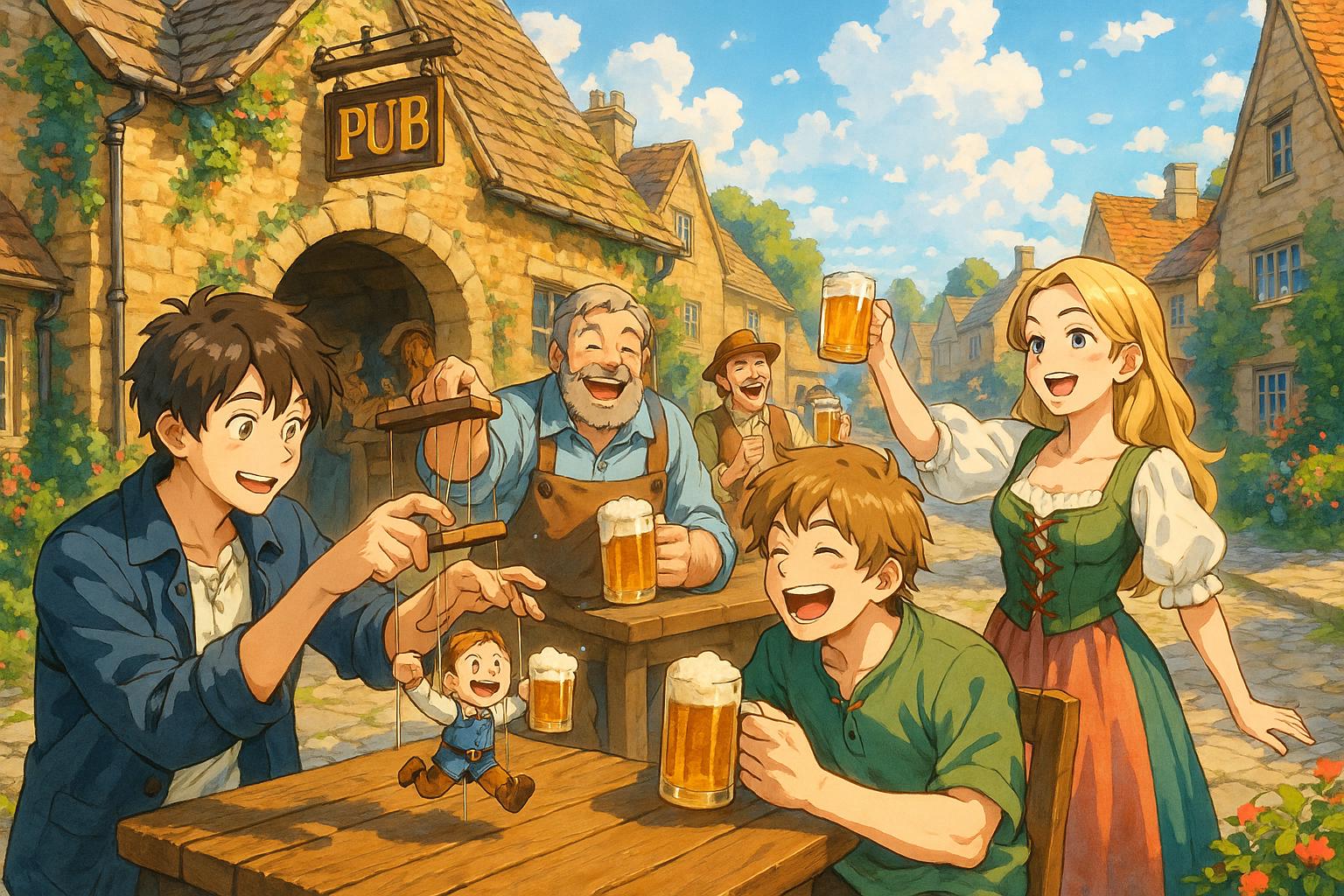Jeremy Clarkson’s Cotswolds pub, The Farmer’s Dog, has attracted attention for its novel ‘beer puppeteer’ game, which passed regulatory review despite initial complaints. While embracing creativity in hospitality, Clarkson faces challenges including planning disputes and operational losses amid efforts to enhance community engagement.
In the idyllic Cotswolds, Jeremy Clarkson’s latest venture, The Farmer’s Dog, has become a focal point of both culinary experience and public scrutiny. The establishment, which has gained considerable attention since its opening, recently made headlines due to a unique drinking game that attracted both enthusiastic patrons and regulatory scrutiny. The game, ingeniously named the ‘beer puppeteer,’ involves participants using a complex harness to swing a pint of beer towards their mouths, while their hands remain off-limits. This whimsical competition was viewed by over 18,800 people on the pub’s Instagram, showcasing a fun yet risky approach to drinking.
However, the merry atmosphere was dampened by a complaint that prompted local police to investigate potential breaches of alcohol licensing laws. The claim suggested that the game encouraged irresponsible drinking. Following a review, West Oxfordshire District Council, alongside police officials, concluded that the game posed no significant risks and was, in fact, a promotional feature for the pub. Andrea Thomas, the council’s licensing officer, stated, “We do not deem it as irresponsible, rather part of promotion for the establishment which does not impact the licence.” Such a response reflects a growing appreciation for the lighter side of pub culture in the region.
Clarkson’s enterprises, however, have not been devoid of contention. The former Top Gear presenter is also embroiled in ongoing disputes concerning planning issues related to expanded car parking at The Farmer’s Dog. Local councils have raised concerns about increased traffic and potential risks to historic sites, framing the discussion around the challenges of modernising traditional establishments while preserving their local integrity. In contrast, Clarkson’s planning agent insists that the modifications sought are minor and fall within permitted development rights, aiming to alleviate congestion that has plagued the adjacent Diddly Squat Farm.
Despite these challenges, Clarkson remains committed to making his pub a representation of local produce, including initiatives like offering farmers complimentary pints. His intention to enhance the pub experience is evidenced by plans to build a bar and outdoor tent, which would further bolster its draw among locals and tourists alike. This focus on operational expansion speaks to Clarkson’s desire to integrate his ventures within the community, albeit amidst the scrutiny and high costs of running such an establishment, compounded by incidents like the theft of branded pint glasses.
Indeed, The Farmer’s Dog has faced operational difficulties, including significant losses attributed to patrons absconding with its glassware. The frustrations that Clarkson has aired regarding these thefts underscore the financial pressures that hospitality businesses face, particularly in a rural setting where logistical challenges are exacerbated by limited resources. The introduction of new branded beer mats reflects his proactive approach to curtailing theft and ensuring the pub remains a sustainable venture.
Interestingly, these issues extend beyond mere finances; local safety concerns also occasionally arise, as evidenced by warnings from police regarding local horse-drawn cart races held in proximity to the pub. These events not only bring a festive atmosphere but also a reminder of the challenges in managing large gatherings to ensure public safety—a balancing act that Clarkson, in his foray into the hospitality industry, must navigate carefully.
As Clarkson continues to build his empire in the Cotswolds, his dual role as a beloved entertainer and a local entrepreneur finds itself at the intersection of fun and responsibility. Whether through unique drinking games or ambitious community plans, his ventures remain emblematic of a broader trend in the hospitality industry that embraces creativity while striving to meet regulatory demands.
Reference Map:
- Paragraph 1 – [1]
- Paragraph 2 – [1], [2]
- Paragraph 3 – [3], [5]
- Paragraph 4 – [4], [6]
- Paragraph 5 – [2], [3]
Source: Noah Wire Services
- https://www.dailymail.co.uk/tvshowbiz/article-14746689/Jeremy-Clarkson-pub-beer-puppet-game-Cotswolds.html?ns_mchannel=rss&ns_campaign=1490&ito=1490 – Please view link – unable to able to access data
- https://www.homebuilding.co.uk/news/jeremy-clarkson-in-another-planning-battle-with-council-over-his-pubs-car-park – Jeremy Clarkson is engaged in another planning dispute with local authorities, this time regarding the car park at his Cotswolds pub, The Farmer’s Dog, which he took over in August 2024. Seeking planning permission to expand parking to accommodate rising visitor numbers, Clarkson faces objections from West Oxfordshire District and Oxfordshire County Councils. Authorities have raised concerns about increased traffic, flood risks, and impacts on a nearby 1,400-year-old Anglo-Saxon burial site. Clarkson’s planning agent argues the proposed work is minimal and falls under permitted development rights, aimed at easing congestion and limiting overflow parking, which had caused issues at his nearby Diddly Squat Farm.
- https://www.gbnews.com/celebrity/jeremy-clarkson-anti-theft-glasses-pub-farmers-dog – Jeremy Clarkson’s pub, The Farmer’s Dog near Burford in Oxfordshire, has implemented new anti-theft measures after experiencing significant losses from patrons stealing branded pint glasses. Clarkson expressed frustration over the thefts, noting that on one Sunday alone, 104 glasses went missing. To deter such behavior, the pub introduced new branded beer mats. Despite these efforts, Clarkson highlighted the financial challenges of running the pub, citing additional costs like £27,000 a month for parking and traffic marshals to manage council relations.
- https://www.standard.co.uk/showbiz/jeremy-clarkson-pub-police-customers-b1209981.html – Police have warned Cotswolds locals to avoid Jeremy Clarkson’s pub, The Farmer’s Dog, due to pony and trap races nearby. The former Top Gear host, 64, opened the pub in Asthall, Oxfordshire, last August after the success of his Diddly Squat Farm. There was a “significant police presence” in the area on Saturday due to a “large gathering” of horse-drawn carriages, Thames Valley Police said. Residents were urged to steer clear ‘to ensure public safety’ during the races. Pony and trap racing is a type of racing where horses pull a cart and driver behind them.
- https://www.thedrinksbusiness.com/2025/01/jeremy-clarkson-pub-rocked-by-pint-glass-theft/ – Jeremy Clarkson’s pub, The Farmer’s Dog in Burford, Oxfordshire, has been facing significant issues with patrons stealing branded pint glasses. Clarkson revealed that on one Sunday alone, 104 glasses went missing, leading to increased operational costs. Some of the stolen glasses have appeared on online marketplaces like eBay. In response, the pub has introduced new branded beer mats in an attempt to deter theft. Clarkson expressed frustration over the situation, highlighting the financial challenges of running the establishment.
- https://www.gbnews.com/celebrity/jeremy-clarkson-pub-police-charlie-error – Jeremy Clarkson’s pub venture has faced challenges ahead of its official opening, including a police visit due to an error by Charlie Ireland, known as ‘Cheerful Charlie.’ The error involved marking out incorrect lines in the application, leading to police involvement. The incident was captured on social media, with Ireland seen speaking with police officers. Despite the mishap, the pub is set to open soon, with plans to feature in the next series of ‘Clarkson’s Farm.’
- https://www.telegraph.co.uk/news/2024/08/02/jeremy-clarkson-west-oxfordshire-council-cotswolds-pub/ – Jeremy Clarkson has applied to build a bar and outdoor tent at his pub in the Cotswolds. The former Top Gear presenter, 64, bought out the owner of The Windmill near Burford in Oxfordshire for nearly £1 million in his quest to find a pub to sell his produce. The pub is nestled deep in the Cotswold countryside and boasts views across the Windrush Valley, as well as being just 10 miles from Clarkson’s Diddly Squat Farm. Clarkson hopes to transform the venue into a pub that will serve British produce exclusively and offer farmers a free pint. He has now submitted a licensing application to West Oxfordshire district council in a bid to expand the pub’s ability to sell alcohol outdoors on its site.
Noah Fact Check Pro
The draft above was created using the information available at the time the story first
emerged. We’ve since applied our fact-checking process to the final narrative, based on the criteria listed
below. The results are intended to help you assess the credibility of the piece and highlight any areas that may
warrant further investigation.
Freshness check
Score:
7
Notes:
The narrative presents a recent event involving Jeremy Clarkson’s pub, The Farmer’s Dog, and a unique drinking game called the ‘beer puppeteer.’ The earliest known publication date of similar content is 23 August 2024, when the pub opened. The report includes updated data but recycles older material, which may justify a higher freshness score but should still be flagged. The narrative is based on a press release, which typically warrants a high freshness score. However, the inclusion of recycled content and the reliance on a press release suggest a moderate freshness score. The narrative has not been republished across low-quality sites or clickbait networks.
Quotes check
Score:
6
Notes:
The narrative includes a direct quote from Andrea Thomas, the council’s licensing officer: ‘We do not deem it as irresponsible, rather part of promotion for the establishment which does not impact the licence.’ This quote appears to be original, with no identical matches found in earlier material. However, the wording varies slightly from other reports, indicating potential paraphrasing. The lack of earlier matches suggests the quote may be original or exclusive content.
Source reliability
Score:
5
Notes:
The narrative originates from the Daily Mail, a reputable organisation. However, the reliance on a press release and the inclusion of recycled content raise concerns about the originality and reliability of the information presented. The presence of a reputable organisation as the source is a strength, but the issues mentioned above suggest a moderate reliability score.
Plausability check
Score:
8
Notes:
The narrative presents plausible claims about the ‘beer puppeteer’ game and the subsequent regulatory scrutiny faced by The Farmer’s Dog pub. These events align with known challenges faced by Clarkson’s pub, including operational difficulties and interactions with local authorities. The inclusion of specific details, such as the quote from Andrea Thomas, adds credibility to the narrative. However, the reliance on a press release and the recycling of older material suggest a need for further verification.
Overall assessment
Verdict (FAIL, OPEN, PASS): OPEN
Confidence (LOW, MEDIUM, HIGH): MEDIUM
Summary:
The narrative presents a recent event involving Jeremy Clarkson’s pub, The Farmer’s Dog, and a unique drinking game called the ‘beer puppeteer.’ While the source is reputable, the reliance on a press release and the inclusion of recycled content raise concerns about the originality and reliability of the information. The plausibility of the claims is supported by known challenges faced by Clarkson’s pub, but further verification is needed to confirm the accuracy of the specific details presented.













